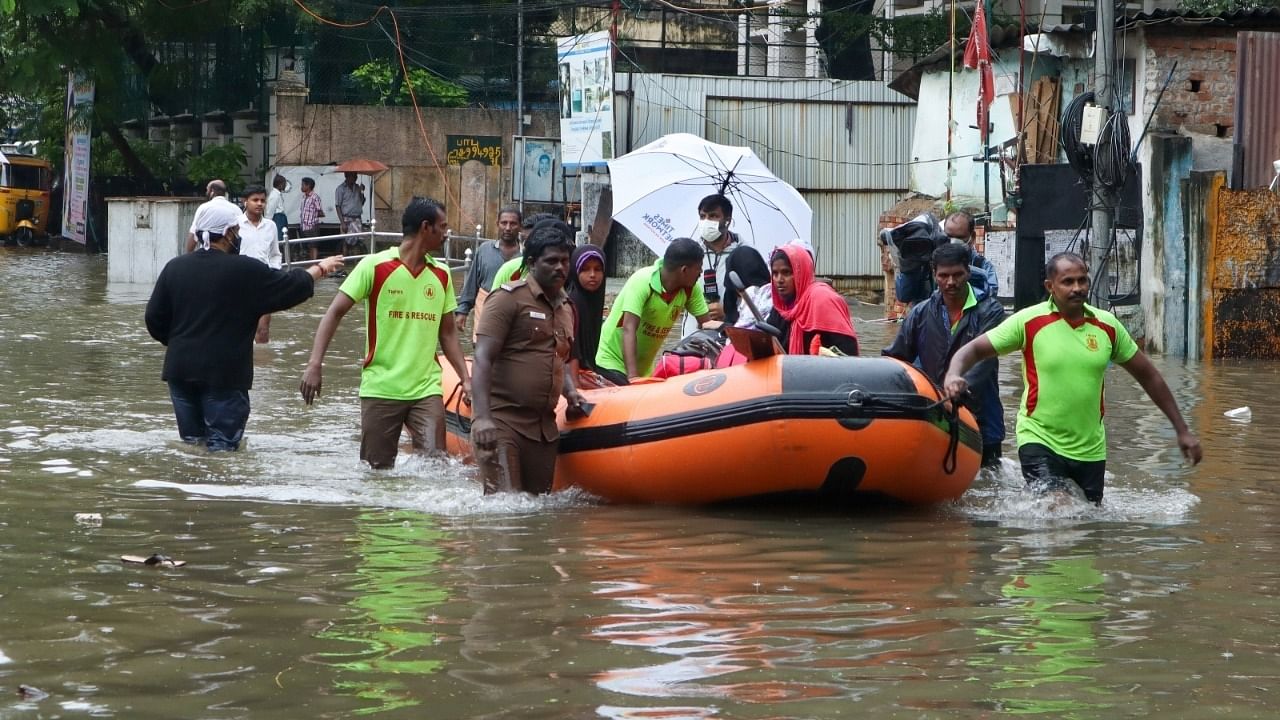
The southern metropolis of Chennai was swamped on Sunday as unprecedented rains, categorised as heavy to very heavy rainfall, continued to lash the city since Saturday evening, bringing back the scary memories of the 2015 floods.
The city received nearly 21 cm of rainfall in just about 24 hours, inundating several low-lying areas and residential localities across Chennai, with a few of them being rescued in boats and residents in localities like Velachery parking their vehicles on flyovers, fearing flooding. Several subways and major intersections were flooded with water even as reservoirs across the state were fast filling up to reach Full Reservoir Level (FRL).
This is the first time that the city received over 20 cm of rainfall since 2015, when heavy rains and the unregulated release of water from reservoirs that supply drinking water to Chennai, led to large-scale flooding. The city’s woes are far from over as the MeT department has predicted heavy rains till November 11.
Chembarambakkam and Poondi reservoirs, both lifelines of Chennai, were filling up fast and excess water was being released from the two lakes on Sunday, prompting authorities to issue a flood warning to those living on the banks of the Adyar river.
Wearing a raincoat, Chief Minister M K Stalin hit the ground by visiting over a dozen flooded localities in the city and inspected the relief work. He also interacted with residents in areas where flooding was severe and assured them of immediate steps to drain the water. Stalin, who was accompanied by Chief Secretary V Irai Anbu and his ministerial colleagues, also distributed food and relief materials to the needy.
Stalin, who also visited the Control Room set up to monitor the situation, announced a holiday for schools and colleges in Chennai, Tiruvallur, Kanchipuram, and Chengalpattu districts on November 8 and 9. He also announced a holiday on Monday for all government offices except those providing essential services and requested private companies to either provide holiday or allow employees to work from home.
As rains continued, Prime Minister Narendra Modi dialled Stalin and extended all help to the state. “Spoke to Tamil Nadu CM, Thiru @mkstalin and discussed the situation in the wake of heavy rainfall in parts of the state. Assured all possible support from the Centre in rescue and relief work. I pray for everyone’s well-being and safety,” Modi tweeted.
As the northeast monsoon (NEM) picked up momentum, Chennai continued to bear the brunt with many areas going under the water. As the city went under water, the Greater Chennai Corporation (GCC) swung into action by opening 44 relief centres in the city to accommodate people who are to be evacuated from low-lying areas and distributing over 50,000 food packets.
Also Read | Kamal Haasan requests fans to extend help amid Chennai flood alert as his 'birthday gift'
The GCC has also placed 500 advanced equipment across the city to pump out rain water from underpasses and other water-stagnated areas.
Though the GCC was proactive in pumping out water and providing relief, the civic body also came under criticism for “not learning lessons” from the 2015 fiasco when the city was cut-off from the rest of the country due to flooding. Pictures of people wading through knee-deep water dotted social media, especially Twitter, as several subways and roads were closed for vehicular traffic due to severe flooding.
In Chennai, several areas, including Velachery, Perambur, Valasaravakkam, and Vadapalani, were flooded even as traffic snarls were reported from across the city. The rainfall received over the last 24 hours is much higher than the 162 mm (16.2 cm) that the city got in 2020 when Cyclone Nivar hit the Tamil Nadu and Puducherry coasts on November 25, 2020.
While Mylapore recorded 226 mm (22.6 cm) rainfall, Ambattur 20.5 cm), and Nungambakkam (20.7 cm). Knee-deep water was reported from several localities in north Chennai where electricity supply was also suspended as a precautionary measure.
Check out latest DH videos here